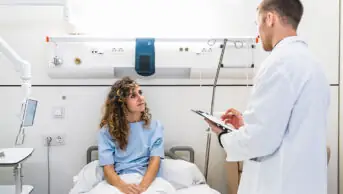
Shutterstock.com
NHS hospital trusts have been given £1.2m to improve computer systems used to refer patients to community pharmacies through the NHS discharge medicines service (DMS), NHS England has said.
The NHS DMS launched nationally as an essential pharmacy service on 15 February 2021 and enables NHS trusts to refer patients to community pharmacy after hospital discharge.
Pharmacy staff can then compare the medicines prescribed by the hospital with those taken before admission to ensure any medicines awaiting collection are still appropriate.
However, referrals through the service have been inconsistent across the country, with an analysis by The Pharmaceutical Journal in January 2022 revealing that 28% of referrals within the service’s first nine months were sent from NHS trusts in one area.
At the time, local pharmacy representatives highlighted the lack of IT systems in some trusts as a barrier to referrals.
NHS England since told The Pharmaceutical Journal on 7 March 2022 that, within the past week, NHS X — the digital arm of the NHS — offered £1.2m to NHS trusts to support either the purchase of IT licences, development of IT solutions or integrating third party systems specifically for transferring patients through the NHS DMS.
This funding was sent to trusts through the lead clinical commissioning group (CCG) for each integrated care system, NHS England said.
The funding follows the inclusion of a new service condition in the NHS Standard Contract for 2022/2023, published on 2 March 2022, requiring acute services, mental health and learning disability services, and mental health and learning disability secure services to “use all reasonable endeavours to refer service users, on discharge from inpatient care and where clinically appropriate, into the NHS Discharge Medicines Service”.
The NHS Standard Contract is mandated by NHS England for use by providers, such as CCGs and NHS trusts, for all contracts for healthcare services other than primary care.
Commenting on the inclusion of the NHS DMS in the standard contract, Alastair Buxton, director of NHS services at the Pharmaceutical Services Negotiating Committee, said: “The CQUIN [Commissioning for Quality and Innovation] target and the inclusion of DMS within the revised standard contract will both help encourage greater engagement of trusts with the service in the year ahead and this is to be welcomed.”
The PSNC added in a statement on 7 March 2022 that the funding will enable more community pharmacies to receive NHS DMS referrals using a structured, electronic message instead of through the more manual route of using NHSmail.
“This should increase the overall volume of DMS referrals,” it said.
In January 2022, the NHS announced that from 1 April 2022, NHS England will incentivise hospital trusts to refer 1.5% of patients through the NHS DMS “within 48 hours following discharge” during 2022/2023 as part of its CQUIN framework, which makes a proportion of NHS trust income conditional on demonstrating quality improvements.
How does the discharge medicine service work?
Once the referral is received, pharmacies are paid £12 to check the referral and compare the medicines that the patient has been discharged with to those that were taken before admission, ensuring that medicines awaiting collection are still appropriate.
Contractors are then paid £11 to check the first prescription received post discharge, taking account of the changes made while the patient was in the hospital.
A further payment of £12 is made once the pharmacist or pharmacy technician carries out a consultation to check that the patient understands their new medicines regimen.
NHS England said on 12 January 2022 that patients “who receive this service are less likely to be readmitted (5.8% versus 16% at 30 days), and spend fewer days in hospital (7.2 days on average compared with 13.1 days for patients who did not receive the service) where they are readmitted”.
An earlier analysis of referral data by NHS England suggested that the discharge medicines service could have helped avoid 17,238 hospital bed days in three months.
You may also be interested in

Only 15% of NHS trusts meet emergency department pharmacy support standards, investigation finds

Hospitals should review pharmacy support in emergency departments, says health safety investigation body
